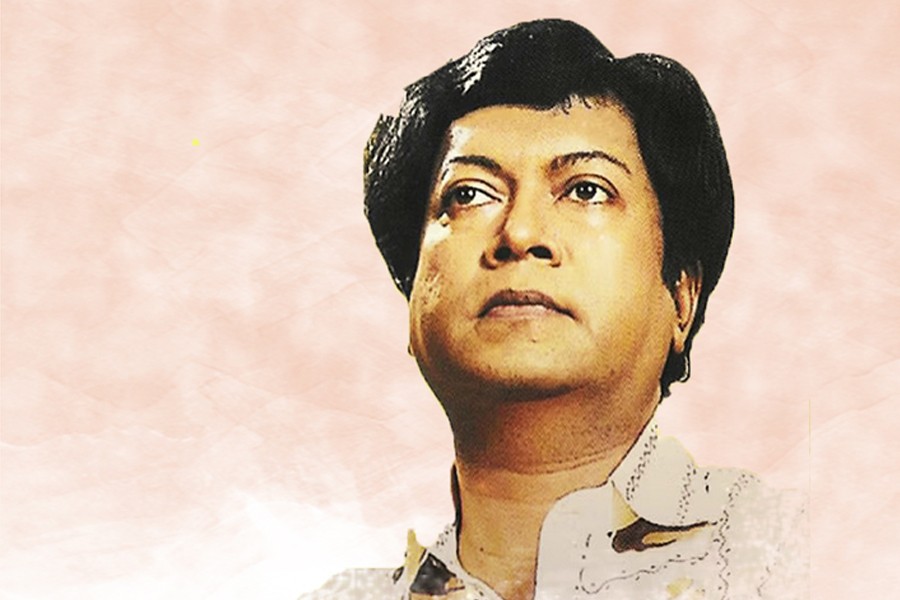
Published :
Updated :

'Konodin jagibe na aar/ janibar garo bedanar/ abiram---abiram bhar/ sahibe na aar--' (Never will he wake up/ to experience deepest pain/ unbearable burden/ no more to bear). Yes, those who end their lives somehow find their pain overwhelming. Yet it may not be compulsive for all to call it a day. Some do retreat from the ultimate decision at the last moment but others may feel the compulsion much too overpowering. Poet Jibananda's protagonist felt that irresistible infatuation with death.
What prompted highly acclaimed Rabindra sangeet artiste Sadi Mohammad to take his own life will perhaps never be known. That a musical artiste of his calibre known for great poise and sobriety can opt for such a violent death cannot but upset any thinking person. A gentleman par excellence, he could not utter anything rude or foul in his 67-year life. Even before committing the act he practised with tanpura. What makes one shudder to think is the final moments when a soft man like him approached the noose. To think of this is to experience a kind of physical spasm. It was so unimaginable and unbelievable that several moments passed before it could be realised that Sadi is no more.
Can PTSI (post-traumatic stress injury) ---an anxiety disorder that he developed after witnessing the killing of his father at the hands of the Biharis in 1971 made him do the unnatural act? It seems the syndrome had been with him all through his life. If his near ones in the family are to be believed, Sadi immersed into deep depression after the death of his mother who was also attacked by the Biharis on that fateful day his father was killed. He had a strong bond with his mother and her demise a year ago left him lonely.
These are strong causes behind triggering the suicidal motive for an ordinary person sentimental enough and full of emotion but not for an artiste of Sadi's stature. Some have indicated that a lack of state recognition for him was highly frustrating, particularly when his younger brother Shibli Mohammad was awarded with the Ekushey Padak for performing art ---dance in his case. It is only natural that an artiste of Sadi's calibre can hope for such awards because he truly deserved one. The rendition of Rabindra sangeet in his deep melodious voice was special indeed. That he was not conferred any of the state recognitions is not his fault, those who failed to award him are to blame for the injustice.
Yet it would be stretching the idea too much that a sense of deprivation pushed Sadi to take his own life. Practitioners of art are passionate and emotional. Think of Van Gogh. Only a single piece of painting, the Red Vineyard painted in November, 1888, was sold from a Brussels' exhibition in March 1890, only four months before he shot himself in the chest with a revolver and died. But Sadi who left the Bangladesh University of Engineering and Technology to pursue music and songs at Rabindranath's Visva Bharati University, Shantiniketan had an orientation of life so fulfilling and life-giving that he ought to have withstood meaner considerations.
Why? It is because he was lucky to learn the music lessons from stalwarts like Shailajaranjan Majumder, Santidev Ghosh and Kanika Bandopadhya. To these exponents of Rabindranath's songs, the poet's sangeet is more precious than any mundane consideration. Rabindrasangeet is a kind of hymn that touches the inner chord of human soul. Once that happens, petty worldly issues become meaningless or insignificant. The songs provide shelter for an agonised or restive soul. Indeed, Sadi Mohammad made the right choice when he made his preference for Bisva Bharati instead of BUET.
Above everything else, there is a process of lifting the soul under the influence of Rabindranath's songs. He extends the ultimate refuge to souls longing for peace and stability. On that count, Sadi was lucky enough. Because he had the opportunity to breathe in where Rabindranath one lived and still have his memories vivid for all to experience. Can it be that even Rabi Thakur has failed to heal the wound Sadi sustained at a young age? His demise is an irreparable loss but even more troubling is the instance his death has created. God forbid, but it may be the case that young people among whom suicidal tendency has of late grown, may feel tempted to follow suit on flimsy grounds. Let's hope the social media do not come up with fictitious stories about the renowned singer's death.


 For all latest news, follow The Financial Express Google News channel.
For all latest news, follow The Financial Express Google News channel.